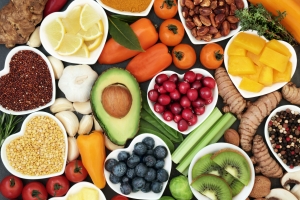Did you know that you are only 1% human? Humans harbour 1-100 trillion microorganisms (bacteria, fungi, yeast) in our guts, which are collectively known as the gut microbiome. This is more microorganisms than the number of genes in our body, technically making us more bacteria than human! These bacteria have many beneficial roles such as production of vitamin K and B vitamins, immune system regulation, digestion of insoluble fibre and they even have an effect on your mood. This community of bacteria develops from the day we are born and by the age of three an adult like gut microbiome is formed. We inherit a similar microbiome to our mothers however, your gut microbiome is unique to you, similar to your finger print. Our gut bacterial community is constantly changing due to many factors such as dietary intake, alcohol consumption, antibiotic use and stress. In recent years, there has been a decline in the number and diversity of bacteria found in our guts, which may have a negative effect on many aspects of our health, one being our weight.
Obesity results from a prolonged imbalance between energy intake and expenditure caused by a complex interplay between genetic susceptibility and nutritional, physiological, social, and environmental factors. Recent research has identified that the gut microbiome may also play a role. The human gut is mostly dominated by two bacterial phyla, Firmicutes and Bacteroidetes. In normal, healthy circumstances, there is a healthy balance between these two phyla in the gut. However, a number of studies have identified a higher ratio of Firmicutes in the guts of obese subjects.
 The gut microbiome plays an important role in digestion of food and energy harvest. Indigestible fibres make it to the large intestine where they are broken down by the gut bacteria. Depending on your microbial make up (higher ratio of firmicutes), you may have an enhanced ability to harvest energy from food. The type of food we consume has a major influence on composition and diversity of the bacteria present. A typical western diet (high saturated fat, high refined carbohydrate, low fibre) is linked to a reduced diversity of bacteria as well as an increased ratio of firmicutes to bacteroidetes.
The gut microbiome plays an important role in digestion of food and energy harvest. Indigestible fibres make it to the large intestine where they are broken down by the gut bacteria. Depending on your microbial make up (higher ratio of firmicutes), you may have an enhanced ability to harvest energy from food. The type of food we consume has a major influence on composition and diversity of the bacteria present. A typical western diet (high saturated fat, high refined carbohydrate, low fibre) is linked to a reduced diversity of bacteria as well as an increased ratio of firmicutes to bacteroidetes.
Many studies in mice have identified a lack of the diversity and composition of bacteria present in the gut with the development of obesity. Mice who are born and reared in a sterile environment (i.e. they have no exposure to germs and have no gut bacteria) were immune to diet induced obesity. Colonisation of their guts with the gut microbiome of an obese individual resulted in rapid and increased weight gain when compared to those colonised by the bacteria of a lean individual, even though food intake and composition did not differ. Similarly, those who were weaned on a western diet, but switched to either a low fat or low carb diet, resulted in significant reduction in weight and an altered bacterial composition (increased ratio of bacteroidetes to firmicutes) in their guts.
 The bacteria in our gut feed off indigestible prebiotic fibre (think the skins of fruit and vegetables, garlic, onion etc.) and they need this to survive, thrive and to multiply and keep us healthy. Digestion of these foods by the gut microbiome produces short chain fatty acids which promote the secretion of satiety hormones and the slowing of gut motility resulting in decreased appetite and decreased energy intake – essentially you feel fuller for longer.
The bacteria in our gut feed off indigestible prebiotic fibre (think the skins of fruit and vegetables, garlic, onion etc.) and they need this to survive, thrive and to multiply and keep us healthy. Digestion of these foods by the gut microbiome produces short chain fatty acids which promote the secretion of satiety hormones and the slowing of gut motility resulting in decreased appetite and decreased energy intake – essentially you feel fuller for longer.
There is huge potential for the targeting of the gut microbiome in the treatment of obesity, however research is in its infancy and is ongoing. Until specific strains of bacteria linked with obesity are identified, it is unlikely we will see this as an intervention anytime soon. There are a number of ways you can optimise your own gut health to increase diversity and the number of beneficial bacteria through diet and lifestyle, which will dramatically improve overall health:
- Get plenty of fibre in your diet, at least 30g a day. The average person only gets 18g of fibre a day which is essentially starving our good bacteria! Increasing fibre intake will promote the growth and diversity of good bacteria in the gut. Some examples include potatoes, leeks, garlic, broccoli, onions, artichokes, beets, beans, lentils, wholegrain cereals and fruit with the skins left on. Remember, variety is key for a diverse bacterial community.
- Avoid antibiotics – Antibiotics were a ground breaking discovery in medicine and have saved thousands of lives since they came about however, over use in the past few decades has seen a decreased diversity of bacteria in the gut. Antibiotics kill pathogenic bacteria but they also kill our beneficial bacteria along the way. Only take antibiotics if it is absolutely necessary and never take them for viral infections.
- Probiotic supplements have been shown to be successful in the repopulation of bacteria in the gut following antibiotic use as well as being a useful treatment for travellers’ diarrhoea, antibiotic associated diarrhoea and improving IBS symptoms (bloating, diarrhoea and constipation). When buying probiotic supplements, check they contain 6-10 billion CFU (colony forming units), this may seem like a lot, but will ensure survival of the digestion process, thereby progressing to the gut where they can provide their beneficial effects.
To summarise, reduced bacterial diversity and gut dysbiosis is linked to weight gain in humans. A typical Western diet and antibiotics have resulted in decline in healthy bacterial strains. Increasing a variety of foods high in prebiotic fibres can increase diversity and promote the growth of beneficial bacteria. Probiotic supplements can help to reinocculate the gut with beneficial bacteria however, diet alterations are necessary to promote the long term survival and growth of these bacteria. Look after your gut bacteria and they’ll look after you!
Free consultation – for the month of April only, limited spaces available
Are you tired of trying countless diets only to find it never works? Do you want to improve your health and nutrition habits? Do you suffer from bloating or any other gut related issues? Sarah currently has a limited number of spaces for nutritional coaching available. This can be done from anywhere in world through skype of over the phone.
For Biomed subscribers only – get a free 30 minute phone consultation with Sarah to discuss your health and nutrition goals and how we can work together to achieve your optimal health.
Contact details:
Instagram: @f.i.g_nutrition_
Email: foodisgoodnutrition@gmail.com
Website: www.fignutrition.co.uk
References for further reading:
https://www.ncbi.nlm.nih.gov/pmc/articles/PMC5003832/
https://www.pnas.org/content/102/31/11070.full
http://diabetes.diabetesjournals.org/content/57/6/1470#F1
https://www.ncbi.nlm.nih.gov/pmc/articles/PMC3687783/
About Sarah



Leave a Comment: